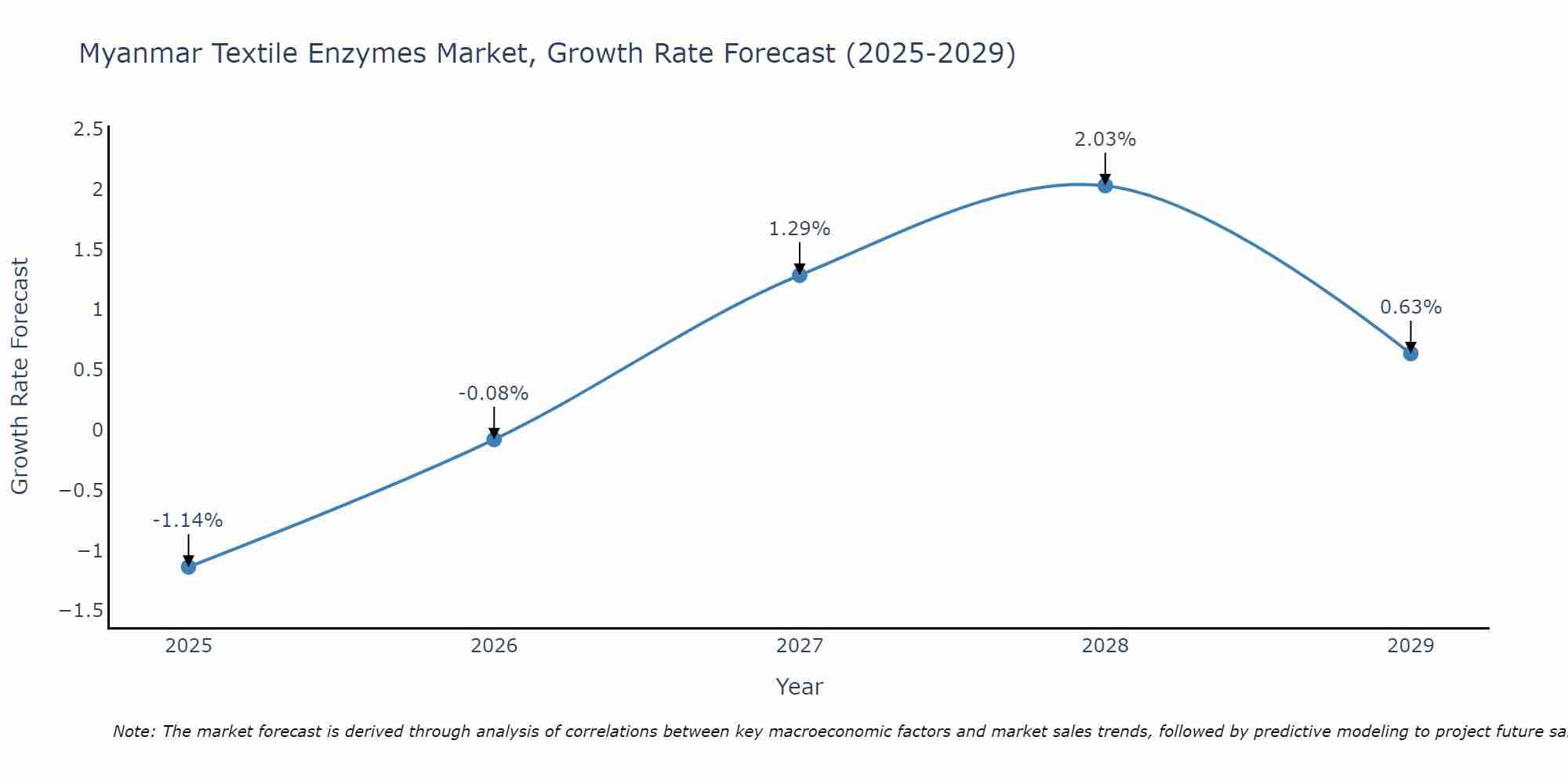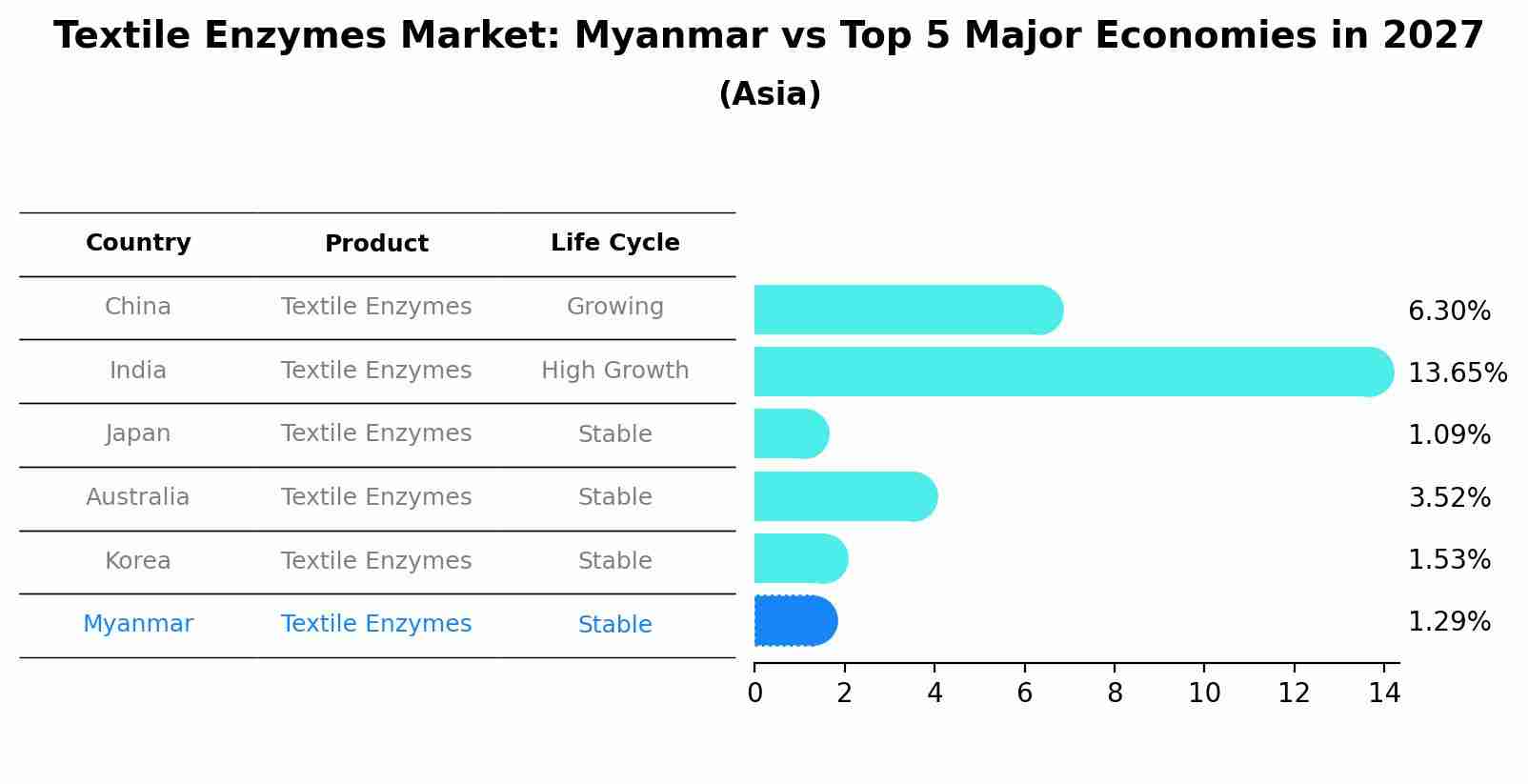Myanmar Textile Enzymes Market (2025-2031) Outlook | Industry, Growth, Size, Revenue, Share, Value, Companies, Analysis, Trends & Forecast
| Product Code: ETC094073 | Publication Date: Jun 2021 | Updated Date: Jun 2025 | Product Type: Report | |
| Publisher: 6Wresearch | Author: Dhaval Chaurasia | No. of Pages: 70 | No. of Figures: 35 | No. of Tables: 5 |
Myanmar Textile Enzymes Market Size Growth Rate
The Myanmar Textile Enzymes Market is projected to witness mixed growth rate patterns during 2025 to 2029. Starting at -1.14% in 2025, the market peaks at 2.03% in 2028, and settles at 0.63% by 2029.

Textile Enzymes Market: Myanmar vs Top 5 Major Economies in 2027 (Asia)
The Textile Enzymes market in Myanmar is projected to grow at a stable growth rate of 1.29% by 2027, within the Asia region led by China, along with other countries like India, Japan, Australia and South Korea, collectively shaping a dynamic and evolving market environment driven by innovation and increasing adoption of emerging technologies.

Myanmar Textile Enzymes Market Overview
The Myanmar Textile Enzymes Market is witnessing steady growth driven by the increasing demand for sustainable textile production processes. Enzymes play a crucial role in the textile industry by offering solutions for efficient and eco-friendly textile processing. The market is primarily dominated by enzymes such as amylases, cellulases, and proteases, which are used for various applications including desizing, biopolishing, and denim finishing. Factors such as the growing awareness about environmental sustainability, stringent regulations on textile waste management, and the shift towards green chemistry are driving the adoption of textile enzymes in Myanmar. Key players in the market are focusing on research and development activities to introduce innovative enzyme solutions that cater to the evolving needs of the textile industry in the country.
Myanmar Textile Enzymes Market Trends
The Myanmar Textile Enzymes Market is experiencing significant growth due to the increasing demand for eco-friendly and sustainable textile processing solutions. Enzymes are being increasingly used in the textile industry to achieve desired fabric properties, reduce water and energy consumption, and minimize the use of harsh chemicals. Key trends in the market include the rising adoption of bio-polishing enzymes for enhancing fabric softness and appearance, the utilization of enzymes for denim finishing to create unique textures and effects, and the growing focus on enzyme-based solutions for reducing the environmental impact of textile processing. Additionally, advancements in enzyme technology, such as the development of novel enzyme formulations with improved efficiency and performance, are driving innovation and expanding opportunities in the Myanmar Textile Enzymes Market.
Myanmar Textile Enzymes Market Challenges
In the Myanmar Textile Enzymes Market, some of the key challenges faced include limited awareness and understanding of the benefits of using textile enzymes among manufacturers and consumers, leading to slow adoption rates. Additionally, inconsistencies in quality control and regulatory compliance pose obstacles for companies operating in the market. Lack of skilled workforce proficient in enzyme technology further exacerbates the challenges faced by industry players. Furthermore, the market is highly competitive with a proliferation of both domestic and international enzyme suppliers, making it difficult for companies to differentiate themselves and maintain pricing power. Overall, addressing these challenges will require investments in education and training, stringent quality control measures, and strategic marketing efforts to promote the benefits of textile enzymes in Myanmar`s textile industry.
Myanmar Textile Enzymes Market Investment Opportunities
The Myanmar Textile Enzymes Market presents promising investment opportunities due to the growing textile industry in the country. Enzymes are increasingly being used in textile processing to achieve sustainable and environmentally friendly production practices. Key investment opportunities in this market include the production and distribution of enzymes for textile applications, research and development of innovative enzyme products tailored to the needs of Myanmar`s textile industry, as well as providing enzyme solutions and technical support to textile manufacturers. Additionally, investing in technology and infrastructure to support the adoption of enzyme-based processes in the textile industry can be a lucrative opportunity in Myanmar`s evolving market landscape. Overall, the growing demand for sustainable textile processing solutions in Myanmar creates a favorable environment for investors looking to capitalize on the Textile Enzymes Market.
Myanmar Textile Enzymes Market Government Policy
Government policies related to the Myanmar Textile Enzymes Market include regulations on environmental protection and sustainability in textile production processes. The government has implemented initiatives to promote the use of eco-friendly enzymes in textile manufacturing to reduce harmful chemical usage and minimize environmental impact. In addition, there are policies aimed at supporting local enzyme production and research activities to enhance the country`s self-sufficiency in this sector. The government also offers incentives and support for companies investing in sustainable practices and technologies within the textile industry, encouraging innovation and growth in the market. Overall, these policies reflect a commitment to promoting sustainable development and responsible business practices in the Myanmar Textile Enzymes Market.
Myanmar Textile Enzymes Market Future Outlook
The Myanmar Textile Enzymes Market is expected to witness steady growth in the coming years due to increasing demand for eco-friendly and sustainable textile processing solutions. Enzymes are gaining popularity in the textile industry as they offer benefits such as reduced water consumption, energy savings, and improved product quality. Additionally, the government`s focus on promoting the textile sector and the rising awareness among consumers regarding the environmental impact of traditional textile processing methods are driving the adoption of textile enzymes in Myanmar. With advancements in enzyme technology and increasing investments in research and development, the market is poised for expansion. However, challenges such as limited awareness among manufacturers and high initial costs may hinder the market growth to some extent.
Key Highlights of the Report:
- Myanmar Textile Enzymes Market Outlook
- Market Size of Myanmar Textile Enzymes Market, 2021
- Forecast of Myanmar Textile Enzymes Market, 2031
- Historical Data and Forecast of Myanmar Textile Enzymes Revenues & Volume for the Period 2021 - 2031
- Myanmar Textile Enzymes Market Trend Evolution
- Myanmar Textile Enzymes Market Drivers and Challenges
- Myanmar Textile Enzymes Price Trends
- Myanmar Textile Enzymes Porter's Five Forces
- Myanmar Textile Enzymes Industry Life Cycle
- Historical Data and Forecast of Myanmar Textile Enzymes Market Revenues & Volume By Type for the Period 2021 - 2031
- Historical Data and Forecast of Myanmar Textile Enzymes Market Revenues & Volume By Cellulase for the Period 2021 - 2031
- Historical Data and Forecast of Myanmar Textile Enzymes Market Revenues & Volume By Amylase for the Period 2021 - 2031
- Historical Data and Forecast of Myanmar Textile Enzymes Market Revenues & Volume By Catalase for the Period 2021 - 2031
- Historical Data and Forecast of Myanmar Textile Enzymes Market Revenues & Volume By Pectinase for the Period 2021 - 2031
- Historical Data and Forecast of Myanmar Textile Enzymes Market Revenues & Volume By Laccase for the Period 2021 - 2031
- Historical Data and Forecast of Myanmar Textile Enzymes Market Revenues & Volume By Others for the Period 2021 - 2031
- Historical Data and Forecast of Myanmar Textile Enzymes Market Revenues & Volume By Application for the Period 2021 - 2031
- Historical Data and Forecast of Myanmar Textile Enzymes Market Revenues & Volume By Bio-polishing for the Period 2021 - 2031
- Historical Data and Forecast of Myanmar Textile Enzymes Market Revenues & Volume By Desizing for the Period 2021 - 2031
- Historical Data and Forecast of Myanmar Textile Enzymes Market Revenues & Volume By Enzymatic Bleaching for the Period 2021 - 2031
- Historical Data and Forecast of Myanmar Textile Enzymes Market Revenues & Volume By Bioscouring for the Period 2021 - 2031
- Historical Data and Forecast of Myanmar Textile Enzymes Market Revenues & Volume By Others for the Period 2021 - 2031
- Myanmar Textile Enzymes Import Export Trade Statistics
- Market Opportunity Assessment By Type
- Market Opportunity Assessment By Application
- Myanmar Textile Enzymes Top Companies Market Share
- Myanmar Textile Enzymes Competitive Benchmarking By Technical and Operational Parameters
- Myanmar Textile Enzymes Company Profiles
- Myanmar Textile Enzymes Key Strategic Recommendations
Frequently Asked Questions About the Market Study (FAQs):
- Single User License$ 1,995
- Department License$ 2,400
- Site License$ 3,120
- Global License$ 3,795
Search
Thought Leadership and Analyst Meet
Our Clients
Related Reports
- Canada Oil and Gas Market (2026-2032) | Share, Segmentation, Value, Industry, Trends, Forecast, Analysis, Size & Revenue, Growth, Competitive Landscape, Outlook, Companies
- Germany Breakfast Food Market (2026-2032) | Industry, Share, Growth, Size, Companies, Value, Analysis, Revenue, Trends, Forecast & Outlook
- Australia Briquette Market (2025-2031) | Growth, Size, Revenue, Forecast, Analysis, Trends, Value, Share, Industry & Companies
- Vietnam System Integrator Market (2025-2031) | Size, Companies, Analysis, Industry, Value, Forecast, Growth, Trends, Revenue & Share
- ASEAN and Thailand Brain Health Supplements Market (2025-2031) | Strategy, Consumer Insights, Analysis, Investment Trends, Opportunities, Growth, Size, Share, Industry, Revenue, Segments, Value, Segmentation, Supply, Forecast, Restraints, Outlook, Competition, Drivers, Trends, Demand, Pricing Analysis, Competitive, Strategic Insights, Companies, Challenges
- ASEAN Bearings Market (2025-2031) | Strategy, Consumer Insights, Analysis, Investment Trends, Opportunities, Growth, Size, Share, Industry, Revenue, Segments, Value, Segmentation, Supply, Forecast, Restraints, Outlook, Competition, Drivers, Trends, Demand, Pricing Analysis, Competitive, Strategic Insights, Companies, Challenges
- Europe Flooring Market (2025-2031) | Outlook, Share, Industry, Trends, Forecast, Companies, Revenue, Size, Analysis, Growth & Value
- Saudi Arabia Manlift Market (2025-2031) | Outlook, Size, Growth, Trends, Companies, Industry, Revenue, Value, Share, Forecast & Analysis
- Uganda Excavator, Crane, and Wheel Loaders Market (2025-2031) | Strategy, Consumer Insights, Analysis, Investment Trends, Opportunities, Growth, Size, Share, Industry, Revenue, Segments, Value, Segmentation, Supply, Forecast, Restraints, Outlook, Competition, Drivers, Trends, Demand, Pricing Analysis, Competitive, Strategic Insights, Companies, Challenges
- Rwanda Excavator, Crane, and Wheel Loaders Market (2025-2031) | Strategy, Consumer Insights, Analysis, Investment Trends, Opportunities, Growth, Size, Share, Industry, Revenue, Segments, Value, Segmentation, Supply, Forecast, Restraints, Outlook, Competition, Drivers, Trends, Demand, Pricing Analysis, Competitive, Strategic Insights, Companies, Challenges
Industry Events and Analyst Meet
Whitepaper
- Middle East & Africa Commercial Security Market Click here to view more.
- Middle East & Africa Fire Safety Systems & Equipment Market Click here to view more.
- GCC Drone Market Click here to view more.
- Middle East Lighting Fixture Market Click here to view more.
- GCC Physical & Perimeter Security Market Click here to view more.
6WResearch In News
- Doha a strategic location for EV manufacturing hub: IPA Qatar
- Demand for luxury TVs surging in the GCC, says Samsung
- Empowering Growth: The Thriving Journey of Bangladesh’s Cable Industry
- Demand for luxury TVs surging in the GCC, says Samsung
- Video call with a traditional healer? Once unthinkable, it’s now common in South Africa
- Intelligent Buildings To Smooth GCC’s Path To Net Zero


















